Shade
Showing 25–48 of 60 results
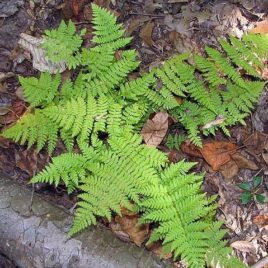
Dryopteris intermedia
Dryopteris intermedia, or Wood Fern, is a dry, woodland, clump growing fern. Wood Fern is a lacy evergreen fern that grows to 1-3’ tall with upright fronds to 40” long and 8” wide. Wood Fern is great for woodland or … Continued
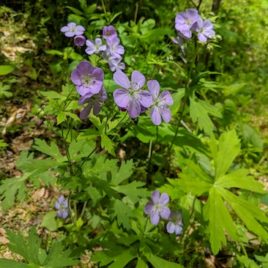
Geranium maculatum
Geranium maculatum, or Wild Geranium, is a charming native 1- to 2-foot perennial woodlander. Wild Geranium is a favorite spring bloomer with lavender blooms and attractive foliage. It prefers shade to part sun and rich, moist soils, but it will … Continued
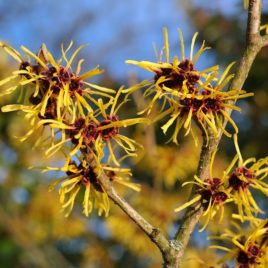
Hamamelis virginiana
Hamamelis virginiana, or Witch Hazel, is a 15-20 foot, native woody deciduous shrub of eastern US with yellow fall foliage and fragrant yellow flowers appearing in late fall to early winter. Witch Hazel prefers full to part shade and medium, … Continued
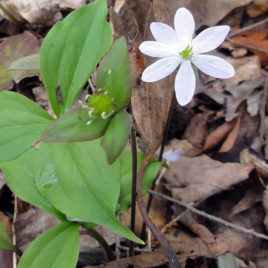
Hepatica acutiloba
Hepatica acutiloba, or Sharp-Lobed Hepatica, is an attractive wildflower found growing in open woods in early to mid-spring. The flowers are white, purple-blue, or pink in color with a round shape, and its leaves are distinctive and mottled, turning crimson … Continued
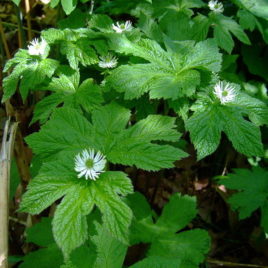
Hydrastis canadensis
Hydrastis canadensis, or Goldenseal, is a 1-foot tall woodland native perennial ground cover preferring shade to part sun and moist to well-drained rich in organic matter. Ornamental maple-like leaves and raspberry-like fruit appear atop its upper leaves in late summer. … Continued
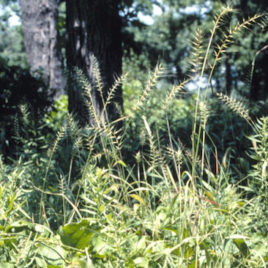
Hystrix patula
Hystrix patula, or Bottlebrush Grass, is an ornamental woodland species with airy, bottlebrush-like seed heads in mid-summer. Bottle Brush Grass grows best in dry to medium soils in shade to part sun. Bottlebrush Grass is a perfect grass for woodland … Continued
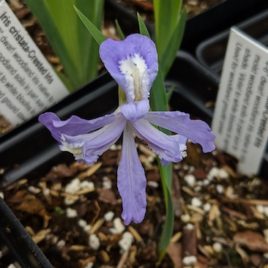
Iris cristata
Iris cristata, or Crested Iris, is a low-growing plant best grown in moist, well-drained soils in part shade. The Crested Iris produces pale blue, lilac or lavender iris flowers with gold crests on the falls on short stems.
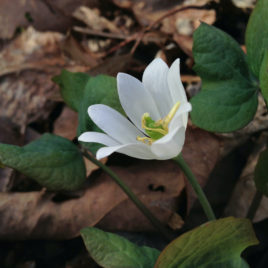
Jeffersonia diphylla
Jeffersonia diphylla, or Twinleaf, is an early spring wildflower with a single white, cup-shaped flower resembling Bloodroot. Twinleaf has long-stemmed leaves, divided into two lobes giving the appearance of two separate leaves, hence its common name. Twinleaf prefers well-drained, medium … Continued
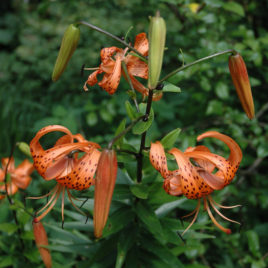
Lilium superbum
Lilium superbum, or Turk’s Cap Lily, is the largest and most spectacular of the native lilies in northeastern North America and attracts the eastern tiger swallowtail butterfly. Turk’s Cap Lily produces beautiful, bell-shaped, yellow-orange “flame” colored flowers with red spots … Continued
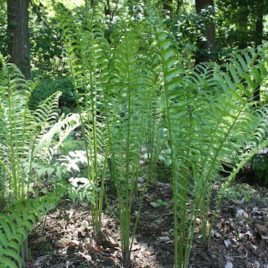
Matteuccia struthiopteris
Matteuccia struthiopteris, or Ostrich Fern, is a 2-6 foot tall fern with erect, dark green fronds. Ostrich Ferns prefer moist to wet soils in shade to part sun. The fern generally occurs in forested wetlands or along creeks. It sometimes … Continued
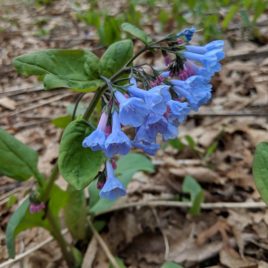
Mertensia virginica
Mertensia virginica, or Virginia Bluebells, is a 1-2 foot perennial woodlander native to moist humus-rich soils in part to full shade. Virginia Bluebells has beautiful pink to light blue bell-shaped flowers, appearing early to late spring. The plant goes dormant … Continued
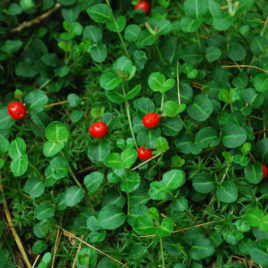
Mitchella repens
Mitchella repens, or Partridge Berry, is a low-growing perennial forming mat-like colonies of interlaced stems. The glossy evergreen leaves are attractive year-round growing a pair of white flowers in spring. When pollinated, a scarlet berry appears.
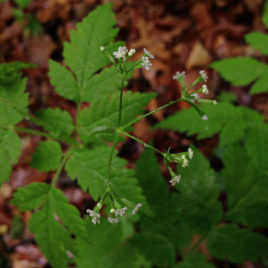
Osmorhiza claytonii
Osmorhiza claytonii, or Sweet Cicely, is a 1-2 foot, woodland perennial with fern-like leaves and tiny white flowers blooming in late spring. Sweet Cicely prefers rich moist soils in shady to semi-shady areas. Native Americans chewed the root or gargled … Continued
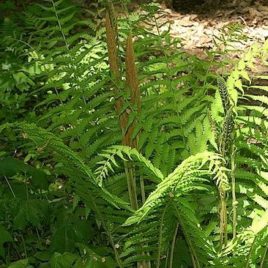
Osmunda cinnamomea
Osmunda cinnamomea, or Cinnamon Fern, is a 2-5 foot tall fern with large, densely hair fiddleheads prominent in spring. The spores on the Cinnamon Fern’s fertile fronds resemble cinnamon sticks. The fern prefers moist to wet soils in shade to … Continued
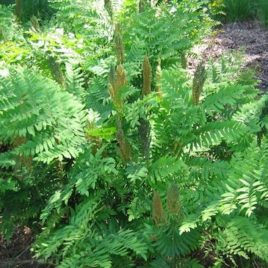
Osmunda regalis
Osmunda regalis, or Royal Fern, is a 2-5 foot tall fern with bluish-green, twice-pinnate fronds. Royal Fern naturally occurs in forested wetlands and thrives on saturated soils. The fern prefers wet to moist soils in part to full shade.
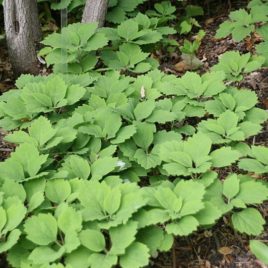
Pachysandra procumbens
Pachysandra procumbens, or Allegheny Spurge, is a 1-2 foot, attractive groundcover with fragrant, white flower spikes appearing in spring (May-June). Later, the white flowers become camouflaged by gorgeous, mottled evergreen foliage.
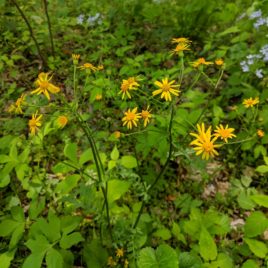
Packera aurea
Packera aurea, or Golden Ragwort (Golden Groundsel), is a 1-2’ tall, herbaceous perennial for average, medium to wet soils in full sun to shady sites. Golden Groundsel or Golden Ragwort produces clusters of small golden flowers in May. It is … Continued
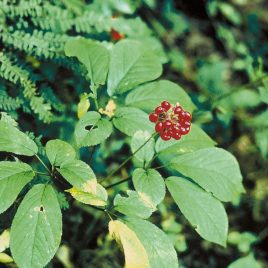
Panax quinquefolius
Panax quinquefolius, or American Ginseng, is 1-2 foot, woodland perennial preferring 70% shade and well-drained, humus-rich soils. American Ginseng’s tiny white umbel flowers appear from June to July. After this, red berries appear in late summer. Ginseng is a popular … Continued
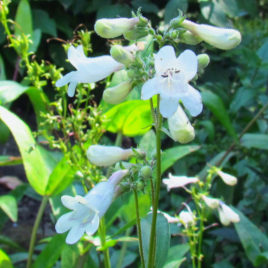
Penstemon digitalis
Penstemon digitalis, or Foxglove Beardtongue, is a 3-4 foot perennial preferring medium, moist soils in sun to shade. Foxglove Beardtongue’s attractive white blooms appear in June-July and attract honeybees, bumblebees, Miner bees, Mason bees, and hummingbirds. Penstemon digitalis is also … Continued
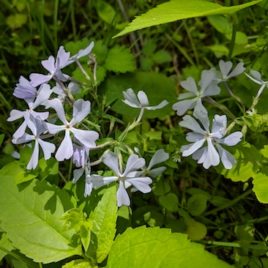
Phlox divaricata
Phlox divaricata, or Wild Blue Phlox, is a 1-2 foot woodland perennial with violet or lavender-blue flowers in spring. Wild Blue Phlox is a wonderful spring beauty for woodland gardens that slowly self sows itself.
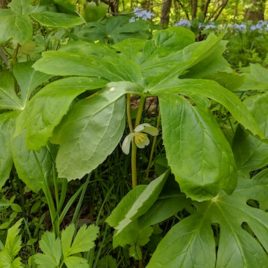
Podophyllum peltatum
Podophyllum peltatum, or May Apple, is a 1-2 foot woodland perennial with unique foliage. May Apple’s large, attractive white flowers bloom in May and June, but they are often hidden by its large leaves. The seeds are dispersed through consumption … Continued
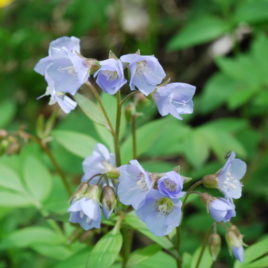
Polemonium reptans
Polemonium reptans, or Jacob’s Ladder, is a 1-2 foot, woodlander perennial with loose clusters of blue-violet, bell-shaped flowers blooming in early to late spring. Jacob’s Ladder prefers damp, organic soils in full to part shade.
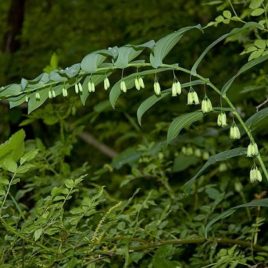
Polygonatum biflorum
Polygonatum biflorum, or Solomon’s Seal, is a 1-2 foot, woodland perennial thriving in moist soils and shade. Solomon’s Seal has white-green, bell-shaped blooms that hang down on arching stems in spring.
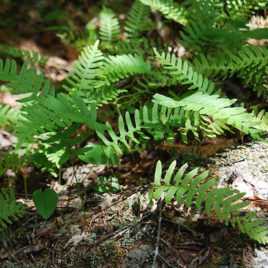
Polypodium virginianum
Polypodium virginianum, or Common Polypody, is a perennial fern producing oblong, evergreen fronds. Common Polypody prefers shaded medium soils. This fern is great for rock gardens or wild gardens as its native habitats are rocky woods, slopes, and cliffs. Common … Continued

